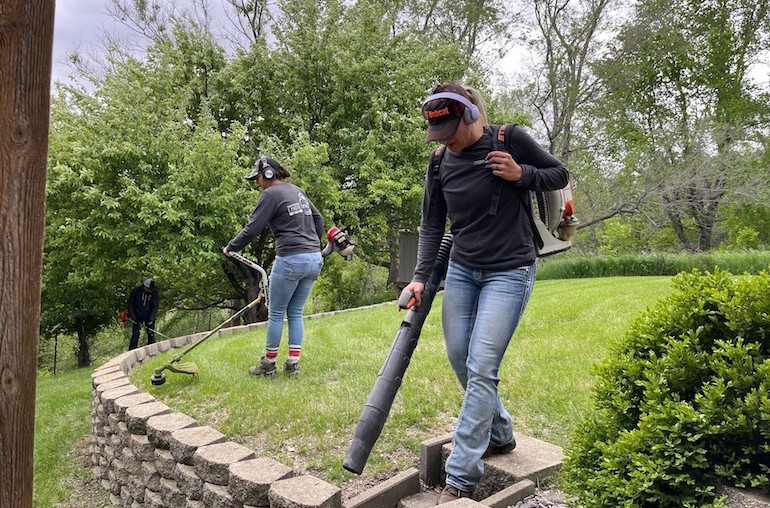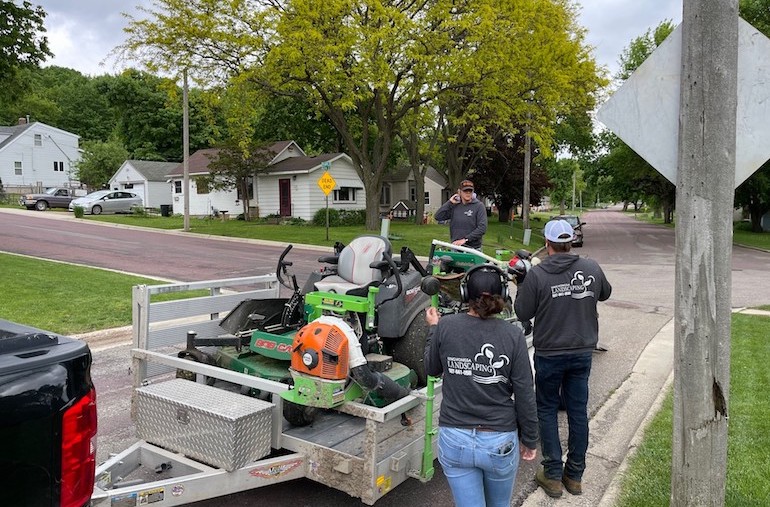Summer is here, and it’s the busy season for a vast majority of lawn care and landscape businesses. Recently, Turf spoke with Chant Singvongsa, owner of Singvongsa Landscaping in Jackson, MN, which he founded in 2009. Chant shared thoughts on how he balances work during the busy season (and year-round), as well what has helped his business grow over the past 12 years.
How did you get started in the lawn care and landscape business?

The idea for starting this business occurred when my wife and I bought a home and needed to mow our lawn. I went to a department store and purchased a 21-inch Craftsman lawn mower. To help pay for it, I knocked on my neighbors’ doors offering to mow their lawns. After slowly growing the number of homes I was servicing, it turned into a side business. Eventually, I secured enough customers to make it my full-time focus and was able to quit my factory job. Today, my landscaping business employs four people and offers complete lawn care, landscaping, hardscaping, snow removal, and tree trimming.
Through my landscaping business, I discovered my passion for sharing what I was learning about entrepreneurship and started a YouTube channel — Chant’s Daily Hustle — where I show my more than 27,000 subscribers what it takes to start from nothing, build a successful business, and positively influence others.
When you started out in the landscaping business, what did you expect to be most challenging?
When I first started my landscaping business, pricing was one of the most difficult aspects to learn. I didn’t know how to price my services or what system to set up to get paid. At the time, I wasn’t even comfortable asking clients for money.
Developing that skillset required research. What really helped me was connecting with other landscapers online through Facebook groups. These entrepreneurs, despite never meeting me in person, were generous with their time and information, and helped me learn the tools of the trade so I could grow my business. For example, they guided me through structuring prices so I could turn a profit and fully cover my costs. They also inspired me to help others in return — I launched my own YouTube channel in 2015.
Another challenge I faced as I started to grow my business was hiring. I started the business doing everything by myself. I didn’t know how to hire and the process required for hiring. I had to learn how to delegate and pay other professionals to do what I’m not good at. One of the key early hires was finding an accountant to take care of payroll and bookkeeping. This is what truly allowed me to start scaling the business.

Would you share how you’ve tackled a challenge (or challenges) in your business?
I’ve learned over the years that the only way to address challenges is head on. If I don’t know the answer or how to fix a problem, that’s when I lean on someone on my team or hire someone to help take care of the issue.
One of the biggest challenges that I faced as a new entrepreneur was spending money on the business. Understandably, when you start a business funds can be tight, but I would try to save the extra dollar and find workarounds, instead of fixing the root problem. Over time you learn and gain confidence in making the investments needed to ensure your business runs smoothly. If there is equipment that will make jobs easier, we buy it. If something needs to be repaired, we fix it right away instead of delaying. This is often more cost-effective in the long run instead of letting your teams be inefficient or letting a problem compound.
Work-life balance is tough for many landscape business owners. Was this a significant challenge for you when you started out in the industry? How have you worked to find a good balance over the years?
At the beginning, I was hungry and was working seven days a week non-stop. I didn’t have a work-life balance for the first 10 years. I just wanted to grow my business as big as I could. I wasn’t thinking of what to do after lawn care and landscaping. As I got older and my kids got older, I thought of where to bring my brand. I couldn’t be in the field all the time, so I hired a team. I would still work in the field, but I had my weekends back. I learned that delegation and hiring the right people is really important for maintaining work-life balance.
Having the right technology in place was also key to freeing up my time. At first, I was doing everything with pen and paper. I got to the point where I knew I had to get systems in place so that it is more manageable. I started using Jobber in 2018. This software saved me so much time. It helped me improve my work-life balance and create a great customer experience for my clients. With Jobber, we can do estimates in the field and send them to customers who can check and approve them on the spot. We can also do things like batch invoicing and schedule routes on the app. The whole team has the app on their phones to clock in and out while on location. Before Jobber, I was doing all these admin-focused tasks after-hours when I could have been spending time with my family.
What practices or strategies do you use that have helped ease your stress level? What have you learned about business management over the years?
I manage stress by identifying the cause and putting a system in place to relieve that stress. There will always be problems and issues in a business, so it’s important to create a system to solve the issue at hand, but to also prevent that same issue from cropping up again in the future.
I like to spend time off with my family. I really enjoy fishing and camping with my sons. I sometimes work in my shop on the weekends and do small tasks like sharpening blades. Little stuff I get to do by myself and that alone time really helps relieve my stress.
Business management requires a person to be patient with everything that is going on in the business and not to take anything personally. Over the years, I’ve learned that all employees and customers are different and operate and think in different ways. You need to learn how to listen to them and adjust conversations based on how they communicate. Acquiring this skill is very important. At the end of the day, the business is our business and has to function and operate in our vision.











![[VIDEO] Dickies®: Discover Workwear That’s Anything But Uniform](https://turfmagazine.com/wp-content/uploads/2023/06/1647663814-4b1a2a7742790a9b1e97a3b963477850192e1d6a9dfba9b07214a77bae25d6e3-d-218x150.jpg)






























![[VIDEO] Dickies®: Discover Workwear That’s Anything But Uniform](https://turfmagazine.com/wp-content/uploads/2023/06/1647663814-4b1a2a7742790a9b1e97a3b963477850192e1d6a9dfba9b07214a77bae25d6e3-d-324x160.jpg)